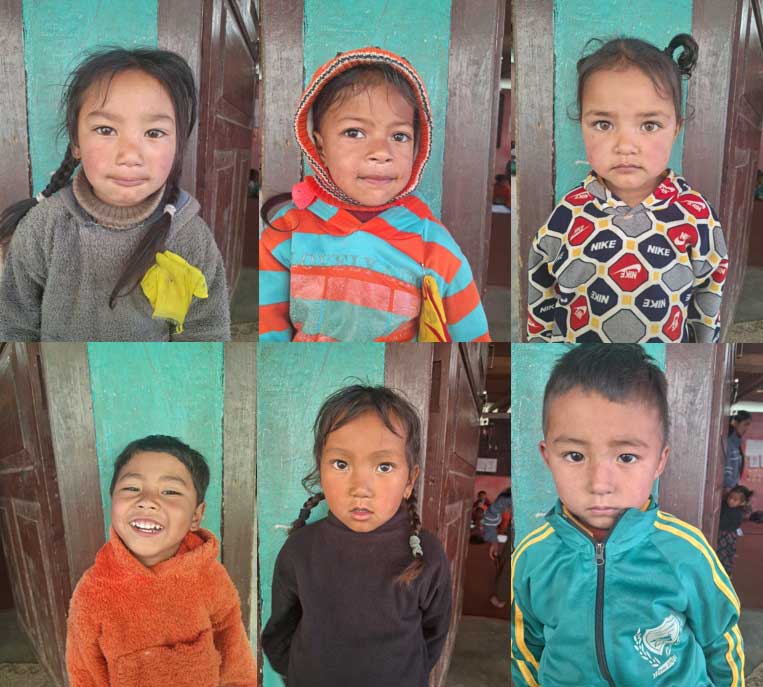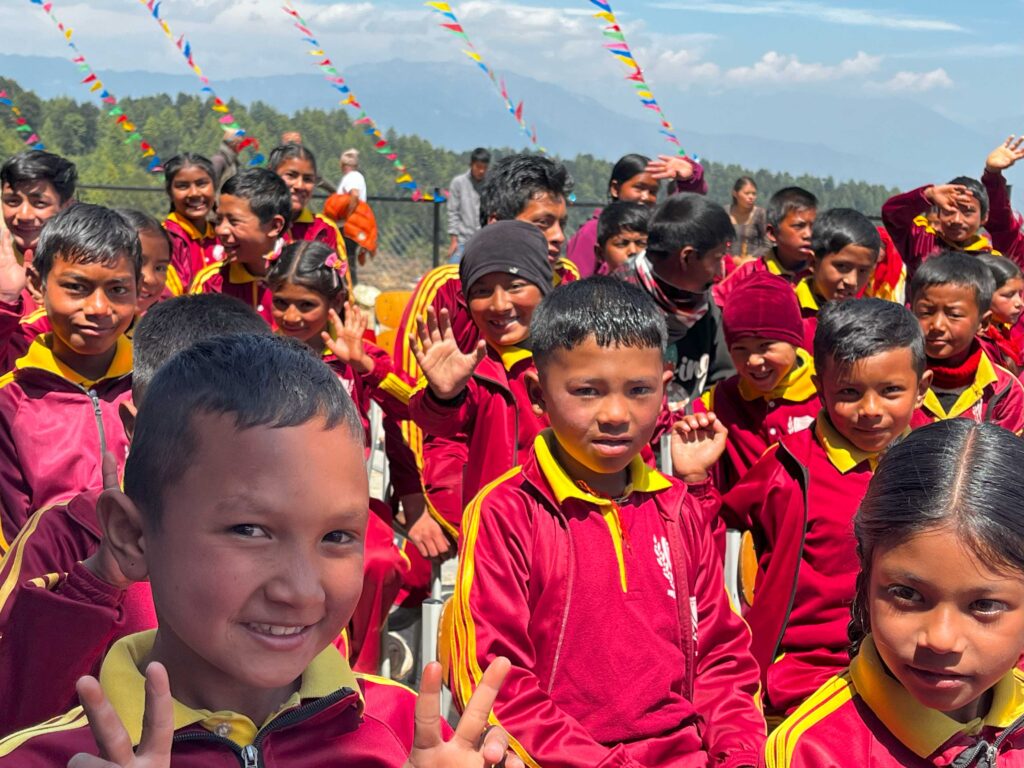
Successful conclusion of the 2080 school year! Happy mothers, Sailung visit and SATSh agricultural project in the starting blocks.
Happy mothers, the birth center is open!
On April 1, 2024 the time had come. The birth center, Shailung Ton Health Post, was festively opened by the former Finance Minister of Nepal Shranker Prasad Koirala and our chairman Jan Post. It was then formally handed over to the community and the Village Development Committee [VDC] in the interest of many invited guests and two Dutch guests. The VDC is responsible for the design and further use of the birth center.
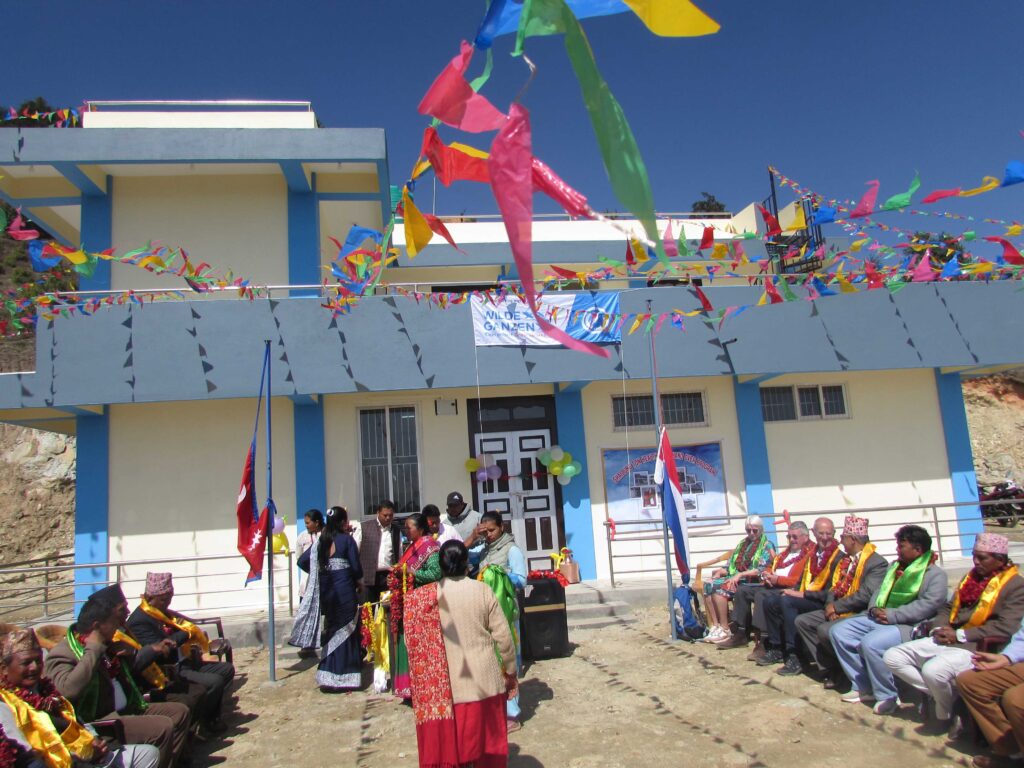
In the first week, a vaccination campaign for babies and toddlers and a TB test were carried out with specialists from the hospital further away.
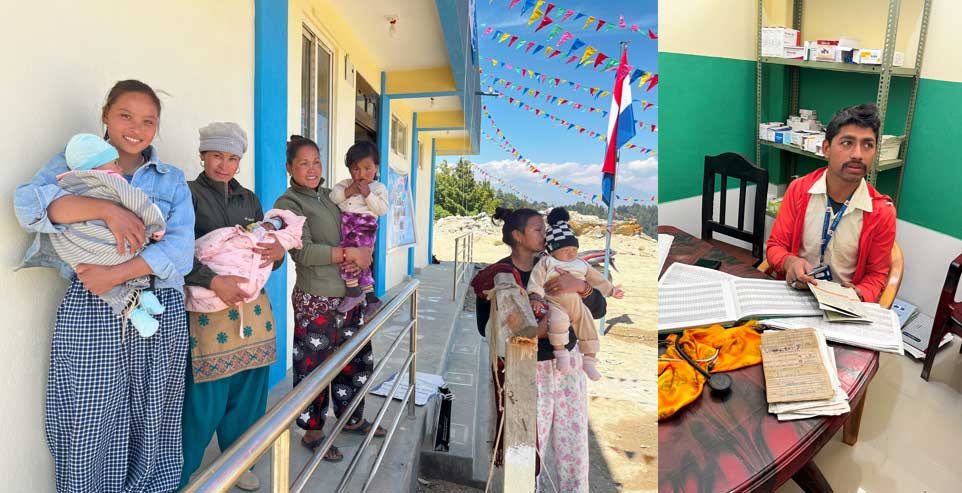
Visit Sailung April 2024
The time has come at the end of March. Together with Désirée and Johannes, Jan Post leaves for Nepal for 3 weeks.
It is great that they too have now been able to experience life in Nepal themselves. It has certainly been a successful trip. Désirée wrote the following report about this trip:
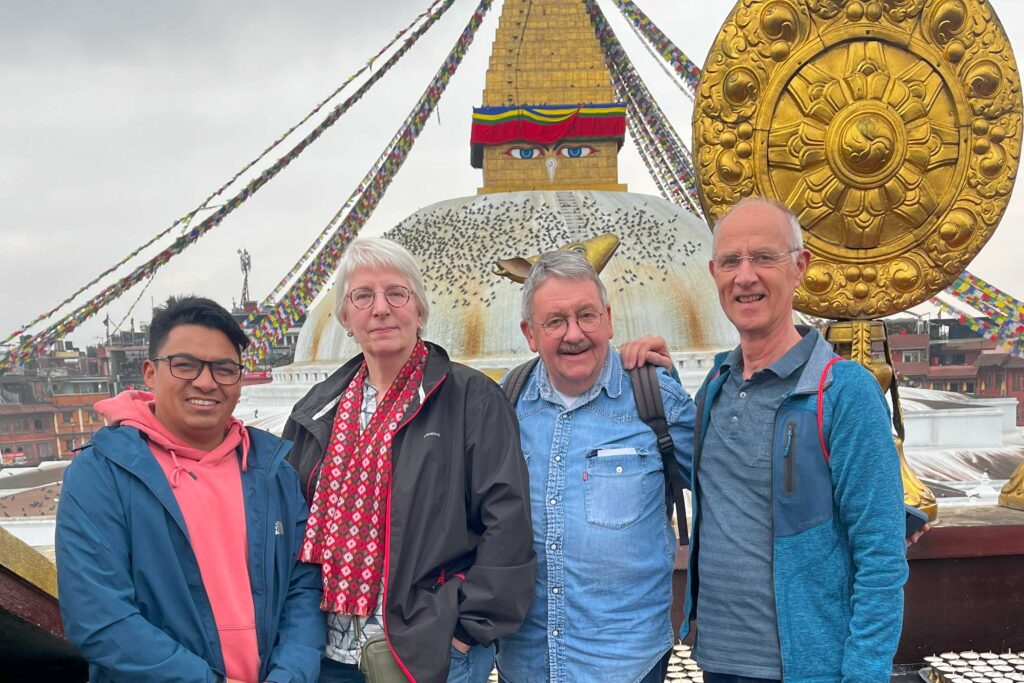
Kathmandu/Sailung/Kathmandu 27/03 to 17/04
If I can write a report with my travel impressions from the past 3 weeks in Nepal, you have even?
Why go to Sailung in Nepal? Do you want to see the Himalayas in the morning sun? Do you want to experience life from a different perspective? A different environment, as a wealthy European?
No, my motivation was to get as close as possible to the place where our friend Ton van den Brink lost his life. Despite his desire to grant the children he met there a better future. And I saw why he had that wish!
After a tough journey (never been to Asia before...) we arrived in Kathmandu, where we were welcomed by Krishna and his cousin Saphal (everything is love: everything is family!). After which we stayed for a few days in a hotel (which met European standards) to get used to a completely different environment. Waking up by the Buddhist monks who start their first noisy prayers at 5.30 am (No, Johannes, it was not a disco…) Which is good, because I am not on holiday to rest and sleep in. Of course it's a culture shock, but I didn't know there would be another one on top of it.
After being tourists for the first two days and having a good meeting with Rotary Club Kathmandu Mid-Town, we really set off for Sailung. I don't wear a watch and that's a good thing! Time is an elastic concept in Nepal. After a day of traveling we arrive in the mountain village. And we are warmly welcomed by the family where we will stay for two weeks. :”Grandpa Jan” is warmly welcomed by the 2 daughters of Krishna and Shanti. This will be our base for visits to farming families, school visits, meetings and walks
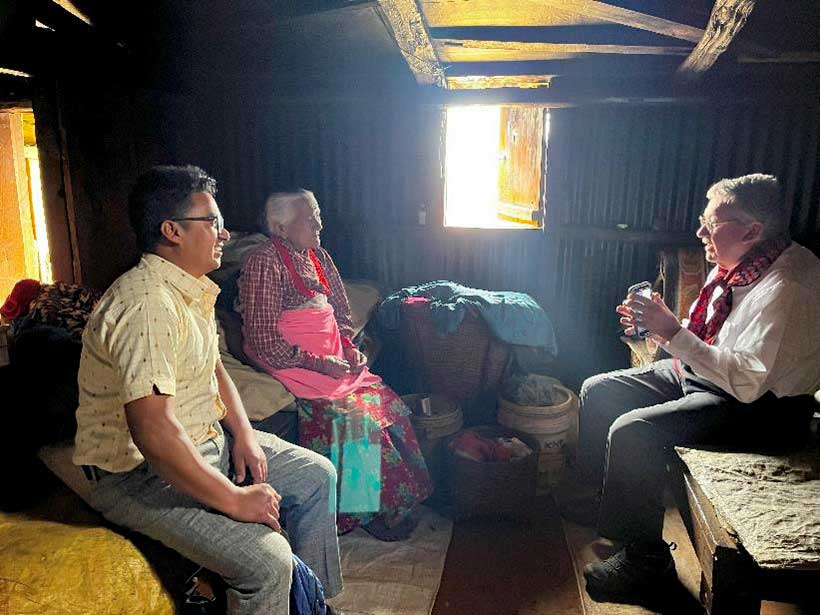
The days are a rollercoaster: an emotional farewell to the oldest students of the school, who are the first group to leave the school. Some of them only started school at the age of 8/10. After 5 years they are ready to take the next step. But where to? The farewell is emotional for both students and teachers. After that, appointments are made very quickly: the opening of the health post, where the next day babies are vaccinated and a population survey takes place for TB (some cases in the region), consultation with the VDC (municipality) about collaborating with other schools to achieve a broad offering in the region. Etc. etc. The pace is high, emotions, thoughts and opportunities tumble over each other. But even though I sometimes think we are not making any progress, positive messages come in the days that follow.
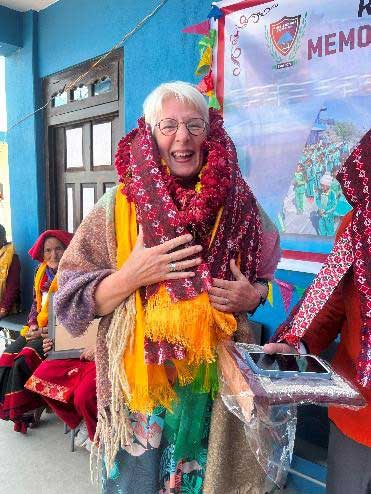
And this atmosphere continues: an appointment with Rotary Club members and ISARD, which will implement the SATSh project, brainstorming about opportunities for further education of the older students in consultation with 2 other schools within the municipality, the transportation of the children to the school, because more than 1.5 hours there and 1.5 hours back is not feasible for toddlers. Developing employment prospects for young people, but also for the families in which they live. Collaborating with artist Ragini Upadhyay. A resort at Sailung High? Thinking about health insurance, processing the harvest, developing products and looking for a market for them? Many issues are discussed in the conversations with local leaders.
Going to sleep every night with a full head, after being wonderfully cared for by the lady of the house with a real meal, cuddling and singing songs with Gracy and Ruth. Wake up with a view of Mount Everest if you are lucky and it is not too steamy. Postpone taking a shower because you don't believe in it right now.
Enjoying the dream that Ton had in mind. And believe in it! It has happened…….
Desirée van der Linden
Agricultural project
Our foundation has come into contact with ISARD, a Nepalese NGO that has years of experience with social/economic improvements in communities in Nepal. With the main driver: improving agricultural methods.
Rotary Club Kathmandu Mid-Town [RCKMT] is impressed by ISARD's professional approach and has taken the initiative to start an agricultural project in Sailung, named: Support Agricultural Transition Shailung (SATSh). ISARD is already being discussed. can carry out a similar project for RCKMT in the future. But ISARD is also impressed by the motivation of the families in Sailung to participate in the project. In other areas, ISARD had to lobby for families to join; In Sailung the enthusiasm is overwhelming and the number of participating families is estimated at 200. A total of approximately 900 people, including 500 children, will join the project. The project will be financed from the world of Rotaries, with RCKMT as the initiator. The so-called Global Grant is explained in more detail below.
In the preparation phase by ISARD, cooperatives have been formed, tests are being carried out with various constructions of plastic tunnels and tests have been carried out in three places with the cultivation of mushrooms.
Everything looks promising. After the rainy season, it will be possible to determine the optimal constructions at the end of August. In the meantime, it has become even more clear that water availability in the area is critical.
At the beginning of May, a group of 6 engineers from Germany and Nepal from the organization Engineers Without Borders made an extensive inventory of the options for guaranteeing water availability in a large area and in relation to planned construction of greenhouses.
NAgro Nepal & greenhouse design Wageningen University.
It is also special how some lines in the Sailung projects come together. Through old fellow students from Wageningen, our treasurer Jan Schouw came into contact with a research group that worked at the university on a project for the development of a large plastic greenhouse specifically for Nepal. They work together with, among others, the Nepalese company NAgro. During the visit, ISARD and NAgro discussed the possibility of placing two pilot units from the Nepal greenhouse in Sailung. All parties see it as a good opportunity to introduce technological progress in Sailung. NAgro will then take care of construction, training and guidance.
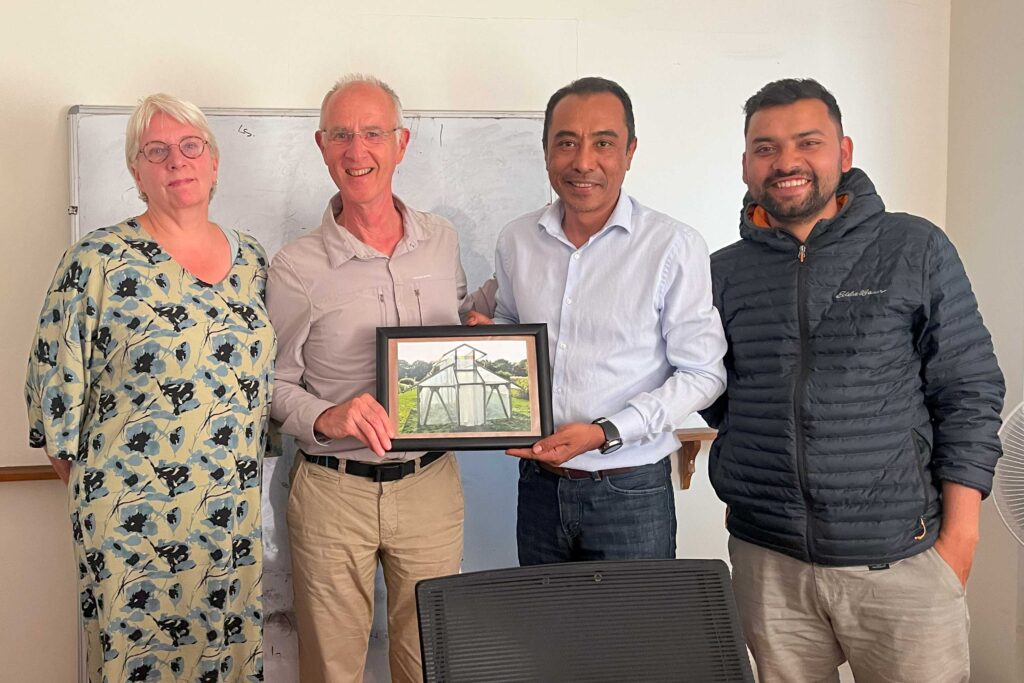
Rotary Global Grant
The SATSh agricultural project has been embraced by Rotary clubs. The design and impact of the project are such that it is estimated that SATSh may be eligible for a Global Grant: a contribution from the global Rotary organization.
Rotary Club Kathmandu Mid-Town and Rotary Club Uelsen-Coevorden are busy completing the Global Grant application. The final phase, in addition to collecting all necessary documents, also involves obtaining financial support from other Rotary clubs, and private initiatives to cover the total request of $135,000. If you are a member of, or have acquaintances at, a Rotary Club who would like to support this wonderful project, you can contact Rotary Club Uelsen-Coevorden.
School
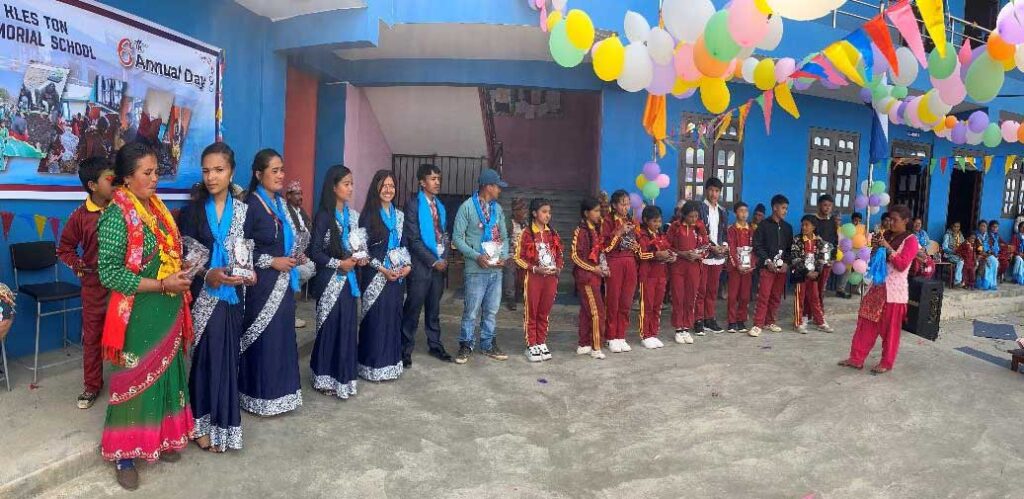
The end of the 2080 school year was also celebrated on April 1. (No April 1 joke because the Nepalese calendar is ahead and on April 13 we celebrated the Nepalese New Year 2081.) There were many guests who were also present at the opening of the Health Post.
The program was nothing short of impressive, with dance performances and talks by various groups, inspiring speeches and a moving farewell to Class 5 – the first class to leave our school. It was a moment steeped in emotion and nostalgia.
Although the future for the children still seemed somewhat uncertain, we have positive developments to report. The school board has had intensive consultations with the VDC and the education inspector about possible expansion of the number of classes and cooperation with other schools that already teach up to grade 8. Following this, there have been several fruitful discussions in the presence of a Dutch delegation.
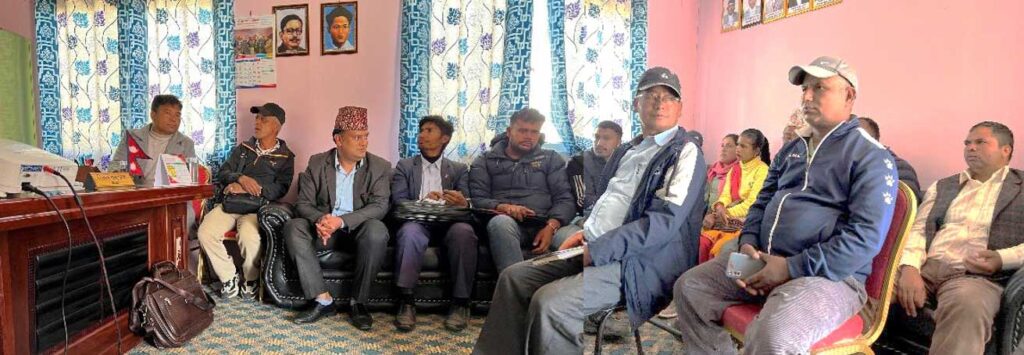
After thorough consultation in recent weeks, the preliminary conclusion is that a partnership will be set up between KLES Ton Memorial School, Shree Shailungeshwor basic school and Shree Mahadev primary school. This will happen under the leadership of Shanti, Krishna and the school board. This is good news for the children of Class 5, because they can now continue studying in their familiar environment, without having to travel to the secondary school which is an hour and a half away
We are also pleased to report that the children of Class 3 and 5 have once again achieved excellent results in the latest school tests. The VDC has indicated that it wants to raise the level of education in the region to the level of KLES Ton Memorial School, which we are proud of.
We look forward to a great collaboration and a promising future for all our students.
We hope to share more details in the next newsletter.
Our foundation under the microscope.
In 2015, all members of the United Nations committed themselves to achieving the 17 so-called Global Goals, THE 17 GOALS | Sustainable Development (un.org). By achieving these 17 goals, the world should look a bit fairer and more equal. 'The job' should be completed around 2030. International solidarity plays an important role in how these goals are to be achieved. And all parties mentioned also include private initiatives. Our foundation is such a private initiative. The University of Nijmegen investigates how these private individuals approach their solidarity objectives and what results they achieve. De Wilde Ganzen are an important partner for the research and the university contacted us through that organization. I was interviewed this spring and the results were presented in a webinar in the fall of 2023. The final report was recently published.
The official title of the study is, in the 'mouthful definition': Citizens and sustainable development: A comparative case study on the role of Danish, Dutch, Belgium and French 'citizens initiatives for global solidarity' in Nepal and Senegal.
Now, we are not set up to contribute to the Global Goals, but on the other hand it is no surprise that our work for decent education for all fits seamlessly into that program. I would like to mention a few conclusions from the report here.
The researchers make a distinction between the 'type' of support given. They come with the following layout:
– First generation support. This is a direct way of support. Money is transferred for a specific purpose. Examples are: supporting a child to go to school. Or the construction of a school or health center to meet basic needs. The target group is often an individual or a family.
– Second generation support. Support is focused on education, training and learning specific skills. This may or may not involve supporting concrete projects. The target group is usually an entire community, for example a village. Collaboration is being sought with governments to support the initiative
– Third generation support. The researchers describe this type as aimed at (government) structures in the country itself. Usually after (a successful) process with a local community, there is a strong focus on takeover by the (local) government. Local structures are also influenced insofar as they influence a successful takeover.
The researchers make no judgment about what is 'right and wrong'. They do note that the impact of the third generation is generally the greatest. They therefore advocate that as an initiative, starting with usually first generation support, moving on to second and third generations over time. The role of the initiator then shifts from 'driver' to 'partner'. And the local partner shifts from 'passive' to 'partner'. The role of the government is moving from 'none' to 'active partner'.
If we compare these conclusions from Nijmegen with our own history, you will see that we are also experiencing a process from the first to the third generation. The direct support of Krishna in his training that started it all was family-like, very focused and 'first generation'. The SATsh project, which has been transferred to the Rotary organization that carries out the project together with ISARD, is of a completely different order and could be called 'third generation'. The focus is on the community, we work with a strong local partner who also directs it and there is close cooperation with the competent authority to scale up the knowledge acquired.
A nice experience to participate in this project and nice to see that our common sense as a foundation is also scientifically recognized. Jan Schouw
On behalf of the Sailung community and board.
Together with the children and the community of Sailung we wish you a wonderful summer!
With your support we will continue.
